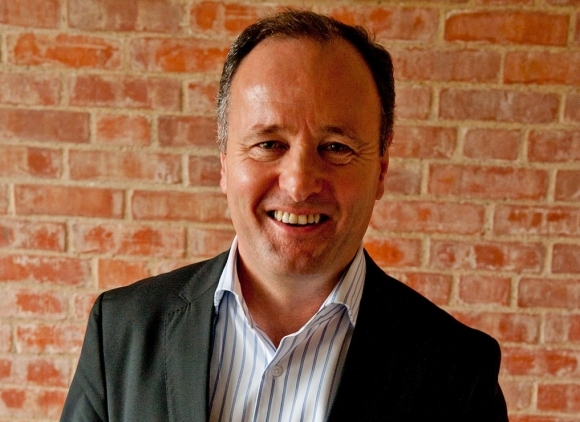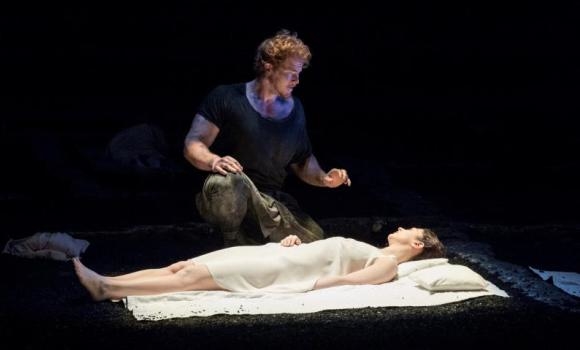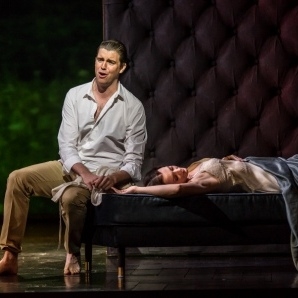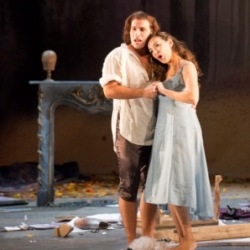Steven Naylor, Glyndebourne's casting guru, spills the beans

© David Fernandes 2012
As operagoers we’re used to watching polished productions unfold before our eyes, with ne’er a thought for what goes on behind the scenes. For every onstage swan, though, there are experts galore paddling away beneath the surface. One of the smartest of these is Steven Naylor, director of artistic administration at Glyndebourne and the man charged with recruiting the company’s lifeblood – its singers.
You have a formidable track record of discovering new operatic stars. How do you go about it?
Good talent always presents itself, but sometimes it’s a question of spotting it and taking a risk on someone. I have a very good colleague, Pål Moe, our casting consultant, who works for us and for Munich, and between us we see a lot of operas and young artist programmes. It’s the Glyndebourne tradition: we fill the chorus with young talented singers, and the best of them are promoted and given small roles. Then, if we can, we give them a bigger role on the tour and progress to the festival.
Describe what happens next, then, when you stumble across a talent like Tara Erraught, who sang Octavian in this year’s Der Rosenkavalier.
Tara is extraordinary. I first encountered her back in 2007. I was on a jury on a singing competition in Dublin and there was this wonderful, instinctive, 20-year-old performer. Even at that age her voice was in a very well developed condition and she got second prize. We auditioned her but we thought 20 was a little too early (we like to take people who’ve at least had opera training and know how to walk across a stage!), but given that she was so precocious we said we’d see her again in two years’ time. In 2008 we gave her The Sandman (in Hänsel und Gretel). That was her first exposure. I got her to cover Hänsel as well – and on the strength of that, in 2011 when we knew we’d be doing Der Rosenkavalier we thought we’d take a risk on her.
I imagine your job is a bit like intelligence gathering. How do you do it?
You have to be assiduous. I find it very revealing to go to college performances: I make a note of anyone who interests me and then check them out again in three or four years time. It’s extraordinary how young singers can develop just in a year or two.
For the general chorus auditions we hear on average 300-350 a year, and often some will come and they’ll be very good singers, just too young. It’s all about keeping an eye on them. We tend to travel to the States, Germany and France, and there’s such a lot of talent out there.
About 12 years ago we decided to bring the Tour into the Glyndebourne fold and use the same ethos as the Festival, with an international pool of singers mostly in the early stages of their career. Are you coming to this year’s Tour? There’s a Russian singer in La traviata who may not have come your way, Irina Dubrovskaya, and there’s promising American tenor Pål and I heard in Philadelphia a few years ago, Zach Borichevsky. In La finta giardiniera we’ve got an amazing Italian soprano, Rosa Feola, as well as Hanna Hipp who went from our chorus to the Royal Opera. Then there’s The Turn of the Screw: Anthony Gregory used to be in our chorus and is returning to play Quint, while Natalya Romaniw, our Governess, has come back a few times just to cover as well as gaining experience in Houston and elsewhere .
Do you have a free hand when you engage singers or do you have to consult each project’s creative team?
We do consult, obviously. There’s nothing worse than the first day a director saying ‘I can’t possibly work with X’. Sometimes we have to steer a fine line when a director and conductor have different tastes, but on the whole they trust us.
Is there anything specific you look for in a ‘Glyndebourne’ singer?
They have to be good communicators! We only have 1300 seats so the singers are close to the audience, which is why we like people who can act well. Musicality is paramount though.
Are you involved in choosing repertoire – i.e. finding works that might suit a potential ‘catch’?
No, because we tend to have our titles planned for four or five years ahead. Occasionally we might change something but by and large we decide on our creative programme and then build the cast accordingly. 2018 is already planned and we’re looking at 2019 now. 2017 is already cast !
There are certain singers who will have started with us but then their fee range goes out of our reach. Everything is so well budgeted here that we know exactly what a season costs down to the last pound. It would be lovely to do three Wagner operas in a season but we know we couldn’t afford it!
Now that you’ve whetted my appetite, who are the new names to look out for in the 2015 Festival?
Igor Golovatenko, who will sing Severo the proconsul in Donizetti’s Poliuto, is a very interesting Verdi baritone. Pål and I heard him three years ago at a singing competition in Moscow. And we’ve got a new bass who’ll be singing Osmin in our production of Mozart’s Die Entführung aus dem Serail, Tobias Kehrer; he is definitely worth keeping an eye on.
There’s an intriguing American tenor in Handel’s Saul, Paul Appleby – I heard him as a young artist at the Met – while in L’Enfant et les sortilèges we have a very exciting soprano, Sabine Devieilhe.
As for The Rape of Lucretia, practically everyone started out in our chorus! Kate Royal, Duncan Rock, Christine Rice, Catherine Wyn-Rogers… And Louise Alder, our Lucia, who won this year’s John Christie Award and covered Sophie in Der Rosenkavalier. She scored a memorable triumph when she sang it in our Proms performance.













